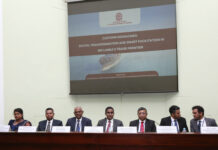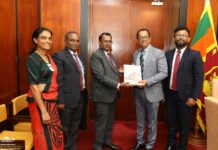A project to provide technical assistance to improve the production and commercialization of fruit value-chains in Sri Lanka has been launched by the Food and Agriculture Organization of the United Nations (FAO) and the Ministry of Agriculture with financial assistance from the People’s Republic of China.
The project, valued at over USD 1.1 million is implemented under the FAO-China South-South Cooperation Tripartite Agreement between FAO, the People’s Republic of China and the Democratic Socialist Republic of Sri Lanka.
Sri Lanka has a rich diversity of fruits with approximately 100 edible fruit crops and the potential for a more profitable industry. However the fruit sector remains under-developed and suffers from poor cultivation and high post-harvest losses leading to low yield and inadequate adherence to international quality standards.
The FAO-China South-South Cooperation Project, which will be implemented in the Kalutara, Gampaha, Moneragala, Anuradhapura and Kilinochchi districts in Sri Lanka, will prioritize the productivity, production and commercialization of three main fruit value-chains; banana, mango and pineapple in the domestic and export markets.
Aimed at developing an inclusive and efficient agribusiness sector in Sri Lanka, the project will increase capacities of processors, traders and other value chain actors to adopt improved post-harvest and processing practices, technologies, business skills and quality standards allowing better domestic and export market opportunities. Public-private partnerships will be promoted to attract medium to large scale investments in fruit orchards and processing.
Speaking at the project inception meeting in Colombo, Secretary to the Ministry of Agriculture, Senior Professor Udith K. Jayasinhe expressed his gratitude to the Government of China, noting that support towards the development of market-oriented inclusive agri-food value chains, particularly high value commercial crops such as fruits is in-line with the priorities of Sri Lanka’s agricultural policy. Prof. Jayasinghe also stated that the project will create opportunities to explore new export markets including in China for fruits, in both fresh and processed forms, from Sri Lanka.
Xie Jianmin, Counsel (Director-General level), Department of International Cooperation of the Ministry of Agriculture and Rural Affairs of China (MARA) stated, “China attaches great importance to agricultural development. While addressing and ensuring national food security, China also actively participates in multilateral South-South Cooperation in agriculture, promoting agricultural development and food security in developing countries. We look forward to collaborating closely with Sri Lanka and FAO, develop innovative models and create new prospects for cooperation in agriculture”.
Experts and technicians will be fielded over a period of two years to offer technical guidance to communities through practical field-based trainings including the setting-up of model fruit farms, training of trainers, and farmer field schools.
Director of FAO’s South-South and Triangular Cooperation Division, Ye Anping highlighted the important role of the experts from Sri Lanka, noting, “The experts and institutions from Sri Lanka have a critical role to play in ensuring that the technologies and practices from China are relevant, replicable and adapted to the local conditions”.
Underscoring the importance of partnerships for innovations, FAO Representative for Sri Lanka and the Maldives, Vimlendra Sharan stated that innovative forms of knowledge and technology transfers led by the global South are transforming lives all around the world.
“In Sri Lanka too this partnership to promote commercial fruit production will boost the livelihoods of smallholder farmers and all value-chain actors, and will contribute to the food and nutrition security of Sri Lankans,” he said.
Li Zhiping, Deputy Director-General, Foreign Economic Cooperation Centre (FECC), Ministry of Agriculture and Rural Affairs (MARA) of China added, “It is hoped that this joint effort will be a model for China-Sri Lanka cooperation in the agricultural sector particularly in times of uncertainties such as the COVID-19 pandemic and impacts of climate change”.
The South-South Cooperation initiatives help developing countries share and transfer agricultural knowledge and expertise among themselves, so that innovation and good practices that have been tested elsewhere in the global South can benefit other countries facing similar challenges. China has been an active participant, strong supporter and major contributor of FAO’s South-South Cooperation, granting USD 130 million to the programme in support of knowledge sharing and technology transfer among southern countries.
Since 2009, the FAO-China South-South Cooperation Programme has conducted about 30 projects at national, regional and global levels, benefitting more than 100,000 people directly from the Global South.












